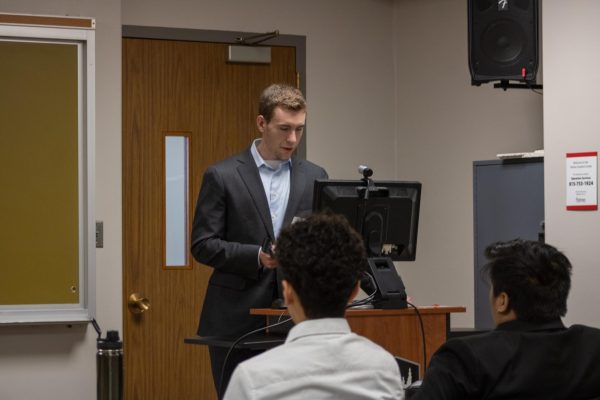DeKalb water proves safe
February 18, 2005
Many students at NIU believe DeKalb water is unhealthy, but according to Colin Booth, a professor in the department of Geology & Environmental Geosciences, DeKalb water may not be as bad as students think.
“The DeKalb water supply is kept clean of harmful organisms and kept within safe levels of any dissolved chemicals,” Booth said.
However, the taste of water can be affected by the plumbing of a building, even if the original supply was good, Booth said.
Booth said he believes many students drink bottled water because the water is portable and easily accessible.
“Many don’t like the taste of their tap water, or because they believe that tap water is unhealthy,” Booth said. “Either tap or bottled water is perfectly fine.”
Drinking bottled water could just be an unnecessary expense, Booth said.
“Mostly it’s just a waste of money to buy bottled water instead of drinking DeKalb water,” Booth said. “Unless your building’s tap water tastes bad, in which case bottled water makes sense if you can’t do anything about it.
Sheena Martin, a sophomore speech pathology major, said she will continue to buy bottled water.
“I don’t mind spending extra money to drink bottled water,” Martin said. “It tastes a lot better than DeKalb water.”
Connor McPartlin, a junior communications major, also doesn’t mind spending extra money on bottled water.
“We get the Culligan man’s water,” McPartlin said. “It’s clean and you can’t taste the radon like you can in the DeKalb water.”
DeKalb’s water is pumped out of wells around the city from two underground sources. The first source is from deep sandstone aquifers, in which the water entered the ground thousands of years ago over a wide regional area. The second source is from sand and gravel aquifers located just west of the city, which probably received most of their water from infiltration of rainfall fairly locally, Booth said.
The water from the deep sandstone aquifers has a natural radium content slightly above the maximum acceptable level, Booth said.
“This used to be a problem, at least in some people’s opinion, but the city now treats its water to remove radium and also mixes it with the water from the shallow aquifers, so it is no longer a problem,” Booth said.
There are many potential health problems that can occur from drinking unsafe water.
“Water that is contaminated by pathogenic organisms from human or animal sewage can cause numerous diseases ranging from mild stomach upsets to fatal illnesses,” Booth said.
In a number of places across the nation, there have also been various health issues from water supplies contaminated with natural or man-made chemicals, Booth said.
“We now have a good standard of federal and state environmental laws and water quality controls that keep most public water supplies healthy,” Booth said. “But we do have to keep on top of proper waste disposal and water protection.”












